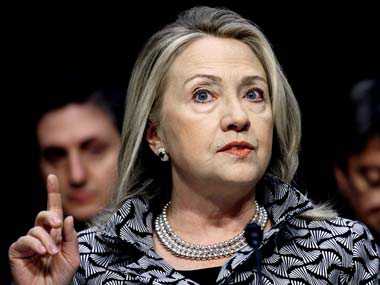US Secretary of State Hillary Clinton leaves next week on an eight-day trip to Scandinavia, the Caucasus and Turkey that will cover security issues such as Iran and Syria as well as the environment and health.
 Clinton will begin her trip May 31 and ends it in Istanbul on June 7, speaking at a counterterrorism forum and holding talks with Turkish officials on Syria, where President Bashar Assad is seeking to crush an uprising against his rule, and Iran, whose nuclear program the United States suspects is designed to develop atomic weapons.
Clinton will begin her trip May 31 and ends it in Istanbul on June 7, speaking at a counterterrorism forum and holding talks with Turkish officials on Syria, where President Bashar Assad is seeking to crush an uprising against his rule, and Iran, whose nuclear program the United States suspects is designed to develop atomic weapons.
Iran, which says its program is for civilian purposes, held a second round of talks with major powers in Baghdad this week and the two sides are due to meet again in Moscow on June 18-19.
AP
At least 50 people, including 13 children, were killed when Syrian forces attacked the town of Houla in Homs province on Friday, the Syrian Observatory for Human Rights and activists said.
Activists said clashes erupted in the town when Syrian forces opened fire on a protest against the rule of President Bashar Assad and killed one protester.
“The soldiers are shelling Houla right now, the casualties are huge,” said activist Ahmad Kassem. He said opposition fighters fired back, inflicting casualties on the soldiers and destroying five tanks. Houla is a cluster of four villages and towns north of Homs.
Also Friday, international peace mediator Kofi Annan announced he will visit Syria “soon” in what would be the former UN Secretary-General’s first visit since he presented his peace plan to Syria’s government in early March.
Ahmad Fawzi, Annan’s spokesman, declined to give details or specify the date, citing security reasons. Fawzi has repeatedly said that Annan, whose six-week-old ceasefire plan has failed to stop the violence in Syria, would travel to the country when the time was right.
UN envoys said on Thursday that Annan may travel to Syria before the end of the month.
Annan’s six-point peace plan called for a truce, withdrawal of troops and heavy weapons from cities, deployment of the monitoring force, and dialogue between the government and opposition aimed at a Syrian-led “political transition.”
“Clearly it’s an important part of this undertaking to have direct talks with the Syrian authorities and the Syrian opposition,” UN Secretary-General Ban Ki-moon’s spokesman Martin Nesirky told reporters in New York on Friday.
“This is done in different ways at different times and it is coming to the time when it’s appropriate for the joint special envoy to engage directly and personally with the Syrian authorities and with the opposition in situ,” he said.
The United Nations is nearing full deployment of a 300-member unarmed UN observer force in Syria that is charged with monitoring any cease-fire resulting from the plan. The force has had close calls with recent bomb attacks but has not lost any observers.
The United Nations and Annan will report to the UN Security Council on Wednesday about the situation in Syria. The 90-day mandate for the UN observer force, known as UNSMIS, expires in July.
Nesirky said there was a fear that a third force or element was “at play in Syria and that this undoubtedly complicates the task for the monitors and the international community in seeking to ensure that the six-point plan is fully implemented.”
“There’s no hard evidence on specific groups,” he said. “It’s obvious that some of the attacks that have been seen are of the kind and nature that suggests that there is behind them a force or element with the organizational capacity and political intent to carry out violence on that scale.”
Ban has said he believes al-Qaida was responsible for two suicide car bombs that killed at least 55 people in Syria this month and that the death toll in the country’s 14-month conflict was now at least 10,000.
Syria has maintained all along that it is facing a “terrorist” conspiracy funded and directed from abroad, not least by resource-rich Gulf monarchies Saudi Arabia and Qatar, which have called for arming the fighters aiming to oust President Bashar Assad.
Syria this month sent the United Nations the names of 26 foreign nationals it said had been arrested after coming to fight in Syria. It described 20 of those as members of al-Qaida who had entered the country from Turkey.
Reuters
via Hillary Clinton’s Turkey visit: Iran, Syria top agenda | Firstpost.